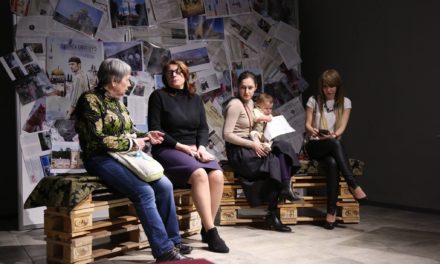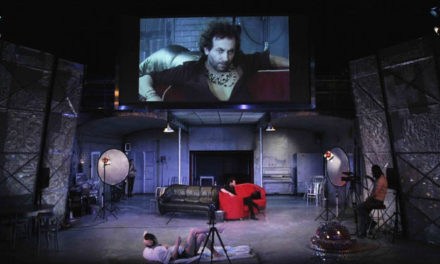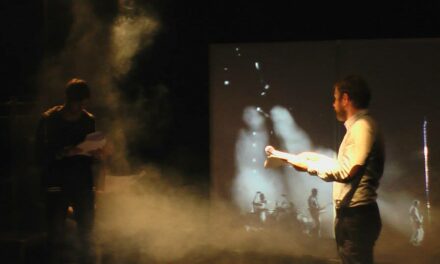Phillip Luswata – “the one from Uganda”
The first time I learned about Phillip Luswata was on a black and white TV. Then, he was a guest on the South African evening daily soap, Egoli: Place of Gold. His cameo had received such favourable coverage that by the time it happened, there had been enough news publications that told us when and where the show would air.
Of course, just like now, DSTV, or simply M-Net as it was called then, was only accessed by a certain group of people, but regular people like me and others would access one of their channels, M-Net for at least one hour on free to air daily.
I later learned that the one free hour that ran for nearly a year was Pay TV’s service providers’ way of marketing both their content, packages, and programming to a new market.
Egoli: Place of Gold was one of the two shows that aired during the one hour slot that M-Net was open; the other was Rock Down Africa.
I don’t know if people at home even watched Egoli or even Rock Down Africa, but somehow, they were always tuned to the free to air M-Net channel to simply enjoy the fancy service free of charge.
But the day Phillip Luswata’s publicised episode aired, it was a full house; not to exaggerate anything, my dad was somehow home. I have no idea how he left work that early on a Wednesday or Thursday.
We were silent, our eyes fixed on the 14-inch black and white screen. The truth is, we had no idea what the story was, nor did we know who was plotting what; we were just there to see this Ugandan student on this TV show.
See also: Wassanyi Sserukenya lived a full life
Then he walked in, probably wearing a black jacket, trousers, and a white shirt. At least according to our screen, we simply watched on because we were not really sure if it was him or not. The newspapers had used a picture of him, but the picture and the guy on TV were very different, so at this point we were waiting for possible clues. But that’s when one of the characters said the magical words, “You are the one from Uganda?”
See, Luswata’s character in Egoli had been written as a Ugandan, and that’s all I ever got to learn. When we heard Uganda, the house went into a frenzy, and we didn’t care about the rest of the episode or the few episodes that followed the few he featured.
To date, I highly doubt any of my family members even know what that episode was about, or Egoli generally.
Phillip Luswata’s life on the big screen
But that’s the first time Luswata came into our lives; we always read about him as the Ugandan guy from Egoli, and then Roul Peck’s Sometimes in April happened alongside Pamela Nomvete; she too had been acclaimed for a South African telenovela, Generations. That film had Idris Elba in it, but for Ugandans in 2005, there was no way Elba could stand close to Nomvete. Of course, in between there, Luswata did Child of a Delegate, a TV drama, Centre Four, Hand in Hand, and Kenya’s Makutano Junction.
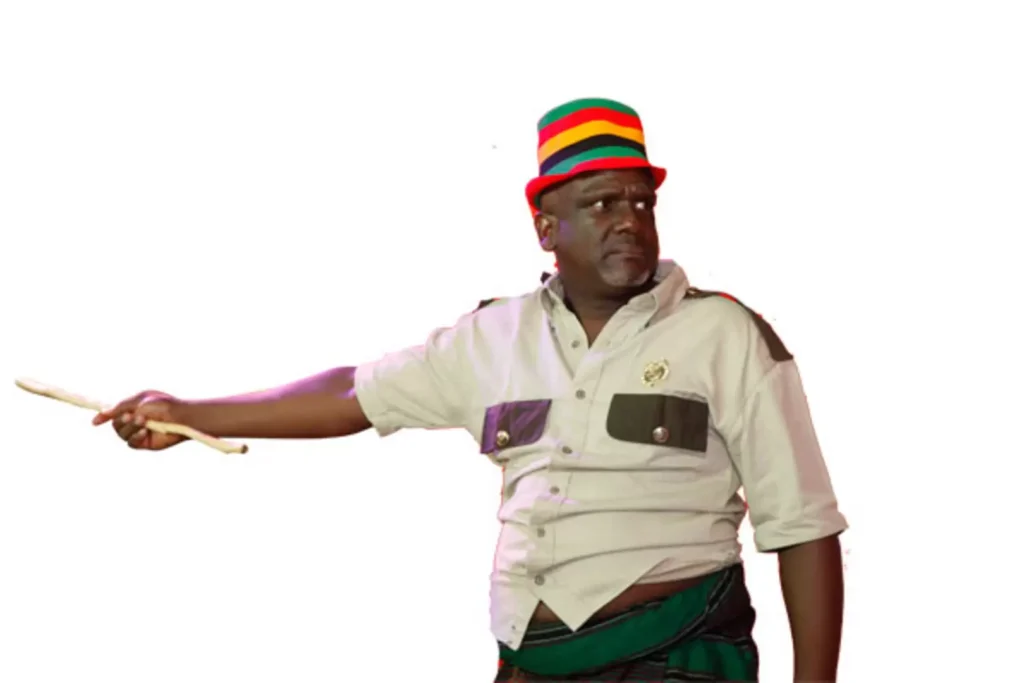
Phillip Luswata is an all-round thespian who’s directing, acting, and writing are all respected in equal measure.
There were so many TV and screen appearances that by 2008, his theatre influence needed explanation for many that were not in theatre circles.
But Luswata has his feet both in film and theatre; it is theatre, however, where he’s most appreciated. An all-round thespian who’s directing, acting, and writing are all respected in equal measure.
Phillip Luswata’s Theatre Career
Sometimes it is not surprising that all his former students, through the years, prefer him for very different training. There are those that praise his writing process and those that can’t get over the acting classes, while many within the industry have learned directing by working and literally copying him.
See also: John Sibi Okumu: Writing on a Dare!
He talks about a time when theatre was vibrant with many companies and the competition was cutthroat. It wasn’t even easy to get scheduled at the National Theatre then.
“The culture of going to the theatre to watch set plays was quite rich… By the time I finished my BA, there was a lot of theatrical competitiveness. There were 800 registered theatre companies in Kampala alone. There were 20 theatre houses—National Theatre, Hollywood Theatre, Riverside, Pride, Biwologoma, Kasisira—a lot of theatrical activity!” he says in one of the interviews.
He, however, agrees that as time went on, the theatre stopped being strict, and in the process, quality was heavily compromised, so the theatre is not as promising as it was.
Nevertheless, unlike many people who consider the state of theatre today as a death, Luswata believes it is a phase; theatre is shedding its skin.
“Right now, we’re all over the place. We’re in a position to try to understand ourselves. People like to say, ‘Theatre is dead’. The theatre has not died. Right now, we are trying to shed our skin. We may seem to be on our downward spiral, but we are actually going up.”
Luswata has experienced good times in theatre, and it is not surprising that he was in the mix of revolutionising Ugandan comedy in the early 2000s. But he’s still coy about his entire contribution, noting that comedy has been around Ugandans since the 1970s.
“Before me, like in the 70s, there was a lot of comedy. Very famous at that time, I remember, was Alex Mukulu with his Muzukulu wa Kabangala. It was (politically) dangerous to be intelligent at that time. So comedy was pretty much slapstick. Let me say that it was the coming of ‘NGO plays’ that pushed comedy out of our theatrical practise. We started doing serious plays that were structured to inform people about malaria, HIV, gonorrhoea, that kind of thing.”
See also: My Ability to Dance and Sing has Played a Big Role in my Career – Dalma
Phillip Luswata – investment in Ugandan theatre
He also acknowledges that by the time he and Theatre Factory set up, Amarula Family, a comedy theatre company, comedy was doing well. However, in the way that Uganda is set up, some comedy content is good or crude enough for ordinary people, while there is a refined form of art brewed for corporate Ugandans.
“If you talk about corporate consumption of comedy in Uganda, that’s where I belong. I’m a pioneer there. I can’t say I’m a pioneer of the genre,” he says.
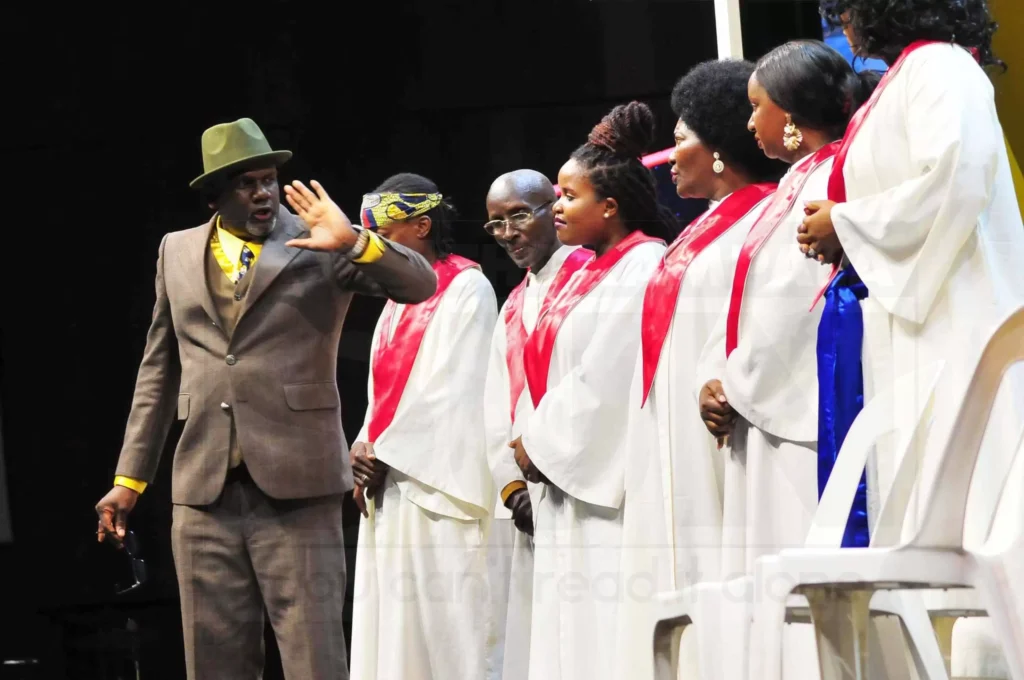
Phillip Luswata created the comedy outfit, Theatre Factory (photo by Nicholas Oneal)
Luswata, ever since, has been passionate about ensuring Ugandans are a happy country. Whether he is talking about theatre or film, he will remind those creating the content that Ugandans don’t like sad stories.
“Think about it; we have a comedy show thrown around Kampala bars every day of the week. Who is making films for this group of people when everyone is making sad films?” he once asked during a film gathering.
It is not very surprising that his plays, Crazy Storms, Quiet, and We Hear, Get Away from Me, including those he has directed, tend towards comedy.
“Well, briefly, I do not do comedy only. My background is very much in ‘enter-educate’ drama. All the comedy I do is actually community conscious and didactic. I am a keen believer that you do not make people learn by stressing them. A smiling face learns better than a gloomy one. With comedy, people learn as they laugh,” he says.
The challenge of theatre space
Luswata has invested in theatre; in 2019, he opened a space called Playwrights Playhouse, whose role was to exhibit the works of different playwrights. He said he has been a victim of the absence of space various times, making works and later failing to find a space to showcase.
“It was a space for actors to hang out in search of playwrights. We did a great rendition of Alex Mukulu’s 30 Years of Bananas as we waited for the playwrights, it was so good it moved him to tears watching it.”
See also: Project Ivelo: A Village, Theatre and Fun
However, just like the other businesses, the Playwrights Playhouse faced challenges when Covid-19 struck that it did not survive.
“We were closed for two years. Our lease run out and we couldn’t service it doing nothing. That effort fell by the wayside; music promoters were compensated for their lost shows, nobody considered promoters of theatre…”
Luswata is, however, not a quitter, after night life reopened in Uganda in 2022, they intended to bounce back just like the other art sectors such as music.
Around that time, a powerful man allegedly groped pop star Sheebah Karungi without her consent.
Luswata wrote the play, Shame on Your Hands to address the situation and other situations involving women’s bodies. The main reason for such a play, he says that he had theorized that local productions had lost social meaning for the locals.
“Everyone who watched it returned for a second helping, but apart from people returning, there was no audience to watch the girls who committed to tell their stories at the National Theatre. I blame you, the people.”
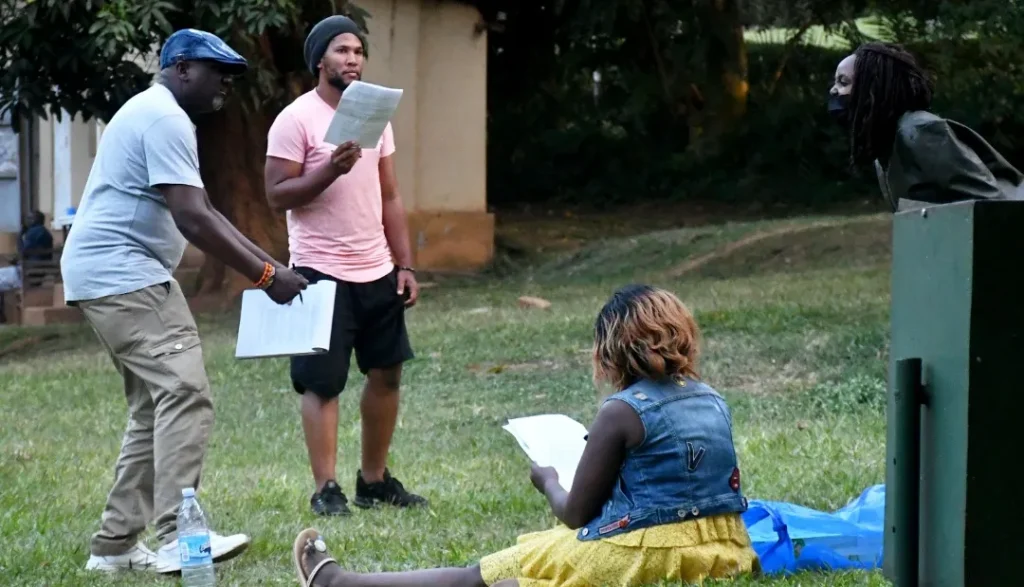
Rehearsals of Philip Luswata’s Shame on Your Hands
Solving the problem – Wava Theatre
He says that he had to go back to the drawing board to understand why there were no people at the theatre, and that is when it struck him. The people moved and theatre did not.
“When we enjoyed the National Theatre, Kampala City Center had a very active night economy. But this economy had now shifted to the suburbs,” he says.
“Before, people used to go back home from the office, dress to the nines and return to the city to enjoy. Today, people go home from the office, throw their shorts and sandals on and walk to occupy their usual high stool spots at the neighbourhood social place in Sonde, Kiwatule, Buziga, Namuwongo, Zana etc. But theatre seems to have been left only in the city center.”
See also: Hope Azeda and Her Art that Heals
His mother used to run a nursery school and it had folded because of Covid-19 and was still thinking of what to do with the space.
“In her space I saw the opportunity to bring theatre and art practice to the suburb, where the night economy shifted.”
Wava Nursery School in Kyengera-Mugongo has since transformed into an open-air theater space Wava Theatre and a walk in art space for the community.
“My mother, who has always been my biggest fun, is now actively transforming herself into an artist; our first victory as a Centre.”
But he is giving himself and the center a challenge, to exhibit 52 new plays for the 52 weekends of 2024. Luswata says that he is learning from social media, it is driven by constant fresh content, just like comedy, it was driven by fresh content every week for the past 20 years.
“We are now launching into a new experiment. Will audiences positively react to the commitment of a completely new full-length theatre play every weekend, throughout the 52 weekends of 2024? Is it even doable?”
As a theatre entrepreneur, Luswata says it is always a learning process, considering that with Ugandan art, most entrepreneurs don’t have successful cases to look back on.
“There isn’t much documentation about art. And art consumption in Africa is not the same as it is in Europe. Ours is also an industry that relies heavily on personalities,” he says.
He also notes that there’s an attitude problem across the board, from the individuals in theatre to the government.
“People coming into theatre nowadays—particularly young creatives—are not committed to developing skills. And talent without skill is not going to get you anywhere. It’s like having a good car with a bad driver. It doesn’t mean the car is not going to overtake. It will overtake before it crashes. Art is eternal studentship. Because experiences of art keep changing. Every day, it’s a new audience you’re writing for. So, you’ve got to keep learning.”
This article appeared in The African Theatre Magazine on February 2, 2024, and has been reposted with permission. To read the original article, please click here.
This post was written by the author in their personal capacity.The opinions expressed in this article are the author’s own and do not reflect the view of The Theatre Times, their staff or collaborators.
This post was written by Kaggwa Andrew Mayiga.
The views expressed here belong to the author and do not necessarily reflect our views and opinions.

